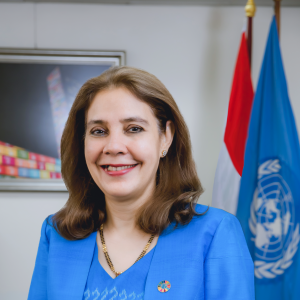Bapak Irfan Bakhtiar, Director of Climate and Market Transformation, WWF-Indonesia
Bapak Ignatius Denny Wicaksono, Head of Business Development 2 Division, Indonesia Stock Exchange
Prof. Lindawati Gani, Board of National Secretariat and Sustainability Oversight Committee, Institute of Indonesia Chartered Accountants
Bapak Eko Hery Wahyanto, Manager of Safeguard, Perusahaan Listrik Negara (PLN)
Mr. Tajeshwar Goyal, Market Engagement Lead for Asia Pacific, TNFD Secretariat
Mr. Hashimoto Mutai, Sustainable Finance Lead, WWF Japan
Bapak Dadiyorto Wendi, Risk Filter Suite, WWF Germany
I am pleased to be here as together we deepen nature-positive practices in the private sector in alignment with the Kunming-Montreal Global Biodiversity Framework.
Indonesia is one of the world’s most biodiverse nations and the private sector plays an immense role in keeping it that way.
By adopting nature-positive approaches, businesses will help conserve and reverse biodiversity loss and environmental degradation.
Let me thank IKBI for front-lining nature risks into sustainability agendas in Indonesia and WWF for leading on this critical issue.
Beyond their environmental impacts, nature-positive practices make good business sense.
This is because over half of the planet’s economic output, or $44 trillion, is dependent on nature in some form, according to the World Economic Forum.
At the same time, however, natural diversity is declining at unprecedented rates with 83% of mammals and half of plants already lost globally.
A major driver of this crisis is the way nature is viewed in economic decisions where natural resources are exploited at unsustainable rates.
Between 2021 and 2023, for instance, about 46 million hectares of natural land was lost globally. And even as ecosystem services diminish, so global GDP will decrease by as much as $27 trillion.
This will inevitably impact bottom lines with a simultaneous decline in vital natural services for economic and social activities, which presents increased risks for economies, financial systems and societies everywhere.
Now is the time for companies, investors and lenders to switch gears and factor nature-related risks and opportunities into their decisions.
However, that necessitates a better understanding of nature-related dependencies and impacts.
To this end, WWF-Indonesia, in partnership with UNEP-FI, is focusing on providing tools for integrating nature-related issues into decision making and ESG reporting mechanisms across industries through real-world examples.
A part of this is a practical guide for improving governance, business strategies, and risk management to help companies and financial institutions align their operations with environmental sustainability via a TNFD framework.
With support from WWF-Indonesia, PT PLN has led the way on this by adopting the framework in recognition of the electricity sector’s responsibility to introduce nature-positive practices throughout supply chains.
Today we are taking a step towards a green transformation across Indonesia.
Together we can save the country’s world-renowned biodiversity while strengthening bottom lines at the same time.
I am looking forward to all the insights at the workshop.
Thank you






